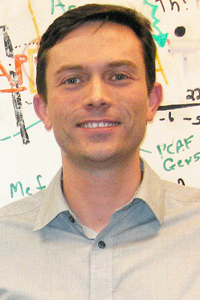
Peter Lewis
Assistant Professor
330 N. Orchard Street, Room 2174
(608) 316-4388
The Lewis Lab explores how misregulation of epigenetic mechanisms contribute to tumorigenesis. The establishment and maintenance of epigenetic states (mediated largely through stable alteration of chromatin structure) help to define cell identity during differentiation and development. In order to preserve cell identity, lineage-specific gene expression must be maintained, and failure to epigenetically silence genes from other lineages has the potential to cause developmental defects or promote tumorigenesis. Our long-term research interests involve elucidating mechanistic principles of epigenetic regulation in biological processes including mammalian development, oncogenic transformation and tumor progression. Our research approaches span the spectrum from highly purified biochemical systems to proteomic and genomic analyses, as well as genetic techniques. Projects in the lab focus on how histone variants and chromatin modifying machinery contribute to epigenetic states. In addition to the canonical histones, mammalian cells possess several histone variants that function in diverse nuclear processes including centromere activity, DNA repair, meiosis, telomere maintenance, and gene expression. Histone variants, such as H3.3, are enriched at select genomic regions by specific deposition machinery, and contain variant-specific residues and post-translational modifications. These variant-specific attributes allow the cell to generate biochemically unique nucleosomes for the regulation of DNA-templated processes.